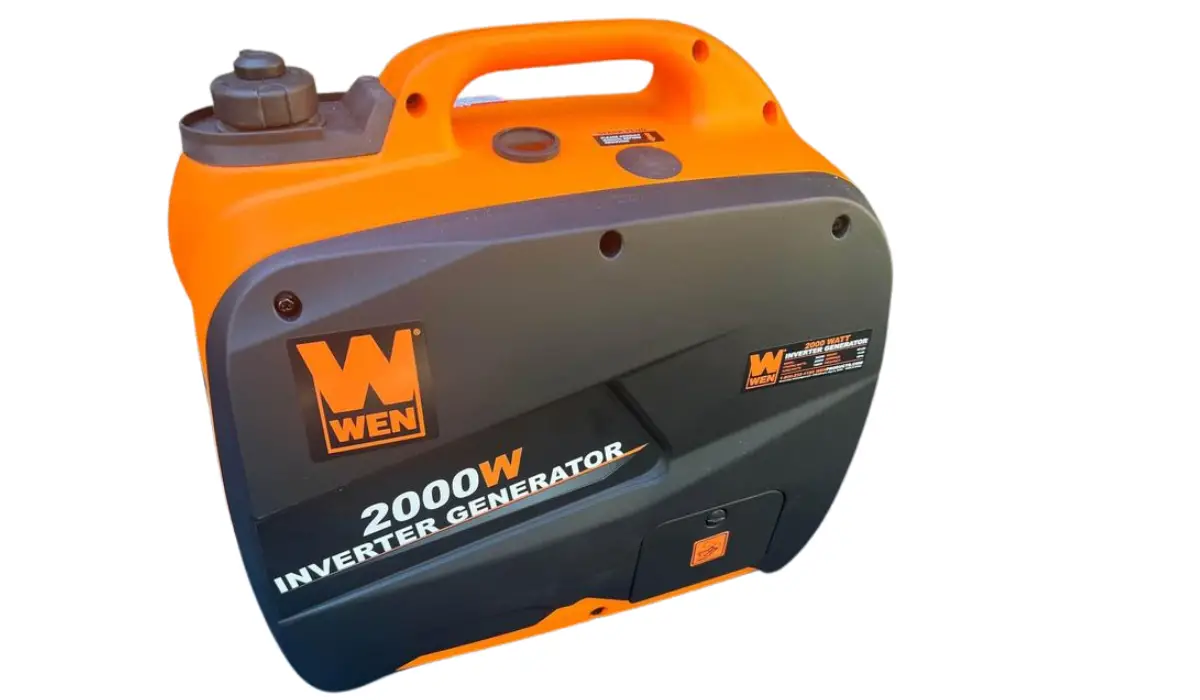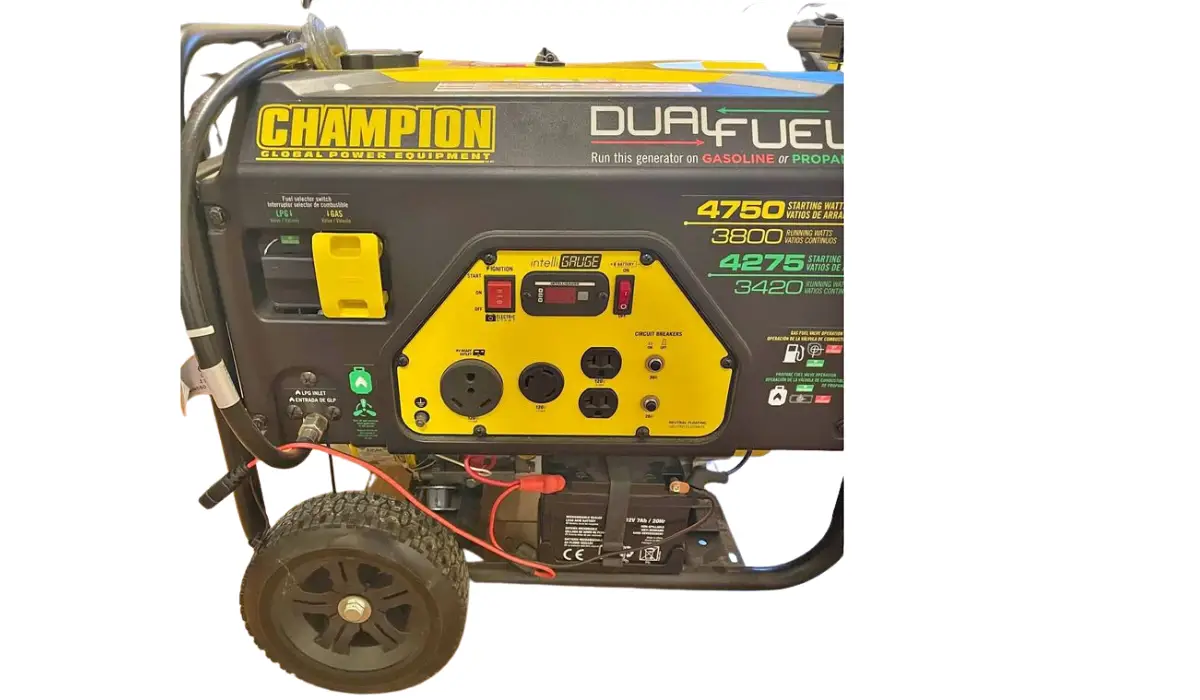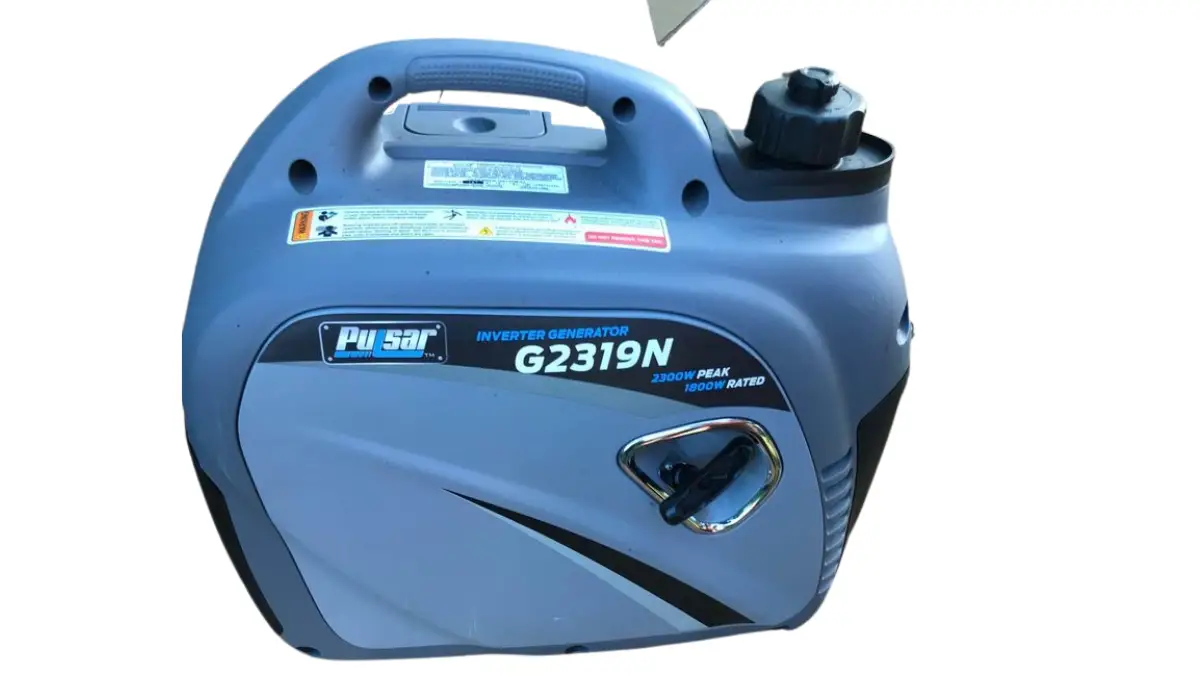The number one way to upgrade your tailgate is to add electricity!
With a portable generator for tailgating, you can turn on a television to watch the pregame coverage, power a speaker for music or an electric smoker for cooking gourmet meats or even run outdoor lights to keep your party going past dark.
The possibilities for your tailgating parties are endless when you have a reliable generator in the mix.
But with all the generators out there, how do you find one that’s suitable for tailgating? In this guide, we’ll look at what makes a portable generator ideal for these outdoor, on-the-go parties.
We’ll also review four of our favorite generators for tailgating on the market today to help you get the tailgate started.
Table of Contents
Best Generator For Tailgating Buying Guide
1. WEN 56200i 2,000-watt Inverter Generator

- Rated Wattage: 1,600 watts
- Noise Level (25% load): 51 dBA
- Weight: 48 lbs.
- Estimated Runtime (50% load): 6 hours
This versatile and quiet inverter generator from WEN is the ideal choice for tailgates that don’t require much power. At just 1,600 watts of running power, you’ll have enough juice for a big-screen television, a speaker system, and a few other electronics – but don’t expect to run an electric grill off this generator.
The generator’s runtime is relatively short at just six hours, which can pose some limitations on the length of your tailgate. However, the Eco-mode switch allows you to conserve fuel when you’re not using all of the generator’s power.
The real advantage of this generator for tailgating is that it’s quiet, producing just 51 dB of noise. That means that you can easily hold a conversation around this generator and won’t bother neighbors or fellow tailgaters nearby.
The 56200i weighs 48 pounds (a little over 50 pounds with fuel), so most people should be able to carry it by themselves from the built-in top handle.
2. WEN 56310i-RV 3,1000-watt Inverter Generator
- Rated Wattage: 2,800 watts
- Noise Level (25% load): 57 dBA
- Weight: 81 lbs
- Estimated Runtime (50% load): 5 hours
The 56310i-RV inverter generator packs more power than its little brother, the 56200i, without cranking up the noise. While you get 2,800 watts of running power out of this generator, it produces just 57 dB – an impressively quiet rating for a generator of this size. Better yet, 2,800 watts is plenty of power for the vast majority of tailgates, even if you plan on firing up an electric grill or smoker.
To take advantage of this extra power, the generator does offer some extra power outlets. This is primarily in the form of an RV-ready 30-amp outlet, which can be plugged directly into the power grid of an RV if that’s the home for your tailgate. However, you can also convert this 30-amp outlet to provide power for high-current appliances.
Runtime is still limited to 7.5 hours on this generator, although it too includes an Eco-mode function to help you conserve gasoline.
Helpfully, this generator comes with an electric starter rather than a choke. All you have to do to start the generator is to turn the power switch.
The 56310i weighs around 80 pounds, making it rather heavy to lift. However, it does have built-in wheels for rolling around once you’ve got it out of your vehicle.
Pros:
- 2,800 watts is enough power for most tailgating appliances
- Relatively quiet at 57 dB
- RV-ready 30-amp outlet
- Eco-mode to conserve fuel
- Electric starter
Cons:
- Short 7.5-hour runtime
- Heavy
3. Champion 3,800-watt Dual-fuel Generator
- Rated Wattage: 3,800 watts
- Noise Level (25% load): 68 dBA
- Weight: 119 lbs
- Estimated Runtime (50% load): 9 hours

This burly dual-fuel generator from Champion is a good choice for anyone who needs a generator that can do much more than tailgating. The generator sports 3,800 watts when running on gasoline and 3,400 watts on propane, making it suitable for all-out tailgate parties as well as extended camping trips, outdoor events, and yard work.
The runtime on this generator is reasonably long at nine hours. However, you can extend the runtime indefinitely when running on propane by simply hooking two tanks in-line with one another.
The generator includes two twist-lock 30-amp outlets, one of which is sized for use with an RV. Having a standard 30-amp outlet can be particularly useful if this is what your electric grill requires.
The biggest downside to this generator for tailgating is that it makes a lot of noise – 68 dB of it. That can make it difficult to hold a conversation and you’ll almost certainly need to add speakers to your television if you plan to hear the audio.
On top of that, the Champion generator is bulky and heavy. The frame-mounted wheels are great for towing it around once you’ve got it on the ground, but you’ll need two to three people to help you lift the 120-plus pound generator out of your truck.
Bonus Picks
Pulsar G2319N 2,300-watt Inverter Generator

- Rated Wattage: 1,800 watts
- Noise Level (25% load): 59 dBA
- Weight: 47 lbs
- Estimated Runtime (50% load): 6 hours
This inverter generator from Pulsar is a good choice if you only need slightly more power than the WEN 56200i can offer – 1,800 running watts as opposed to 1,600. For many tailgaters, that can be the difference between having a speaker system or not.
That said, you do lose some major advantages of the WEN generator while paying roughly the same price. This generator is limited to a six-hour runtime, although it has an economy switch to help you conserve fuel. It also produces 59 dB of noise compared to the WEN’s 51 dB, which means that it is almost 10 times as loud.
The generator does have some good features for tailgating, including a connection for parallel operation and a USB port for charging your phone. It’s also lightweight at just 47 pounds, so it’s relatively easy to carry in and out of your vehicle.
Westinghouse iGen2200 Super Quiet Portable Inverter Generator
The Westinghouse iGen2200 generator is one of the best models for tailgating on the market. At just 19.8 x 11.4 x 17.9 inches long with a weight of 46 pounds, this generator is ideal for traveling around.
It won’t take up too much space in the trunk and no one will be tripping over a massive generator.
This strong generator offers excellent power at 2200 watts, which is strong enough to power multiple small appliances without getting overworked.
The generator houses two 120V outlets as well as two USB outlets, so you can charge your phone and tablet while still running your appliances.
As the name suggests, this is a super quiet generator. Running at only 52 decibels, this model is quieter than a lively conversation.
At your tailgating party, you are sure not to hear it over all the fun and excitement!
If you need more power than what this generator has to offer, feel free to run it alongside another model thanks to its parallel capabilities. You can pair it with several other Westinghouse generators on the market, provided that you have a parallel cord as well.
How to choose the right generator for tailgating
Finding the right generator for tailgating is important if you’re planning to add electrical power to your party. You don’t want to go through the hassle of buying and carrying around a generator, only to find that it doesn’t have enough juice for your appliances or makes so much noise everyone is asking you to turn it off.
To help you find the best generator for tailgating, let’s look of some of the factors you should consider.
1. How Much Generator Power for Tailgates?
There’s nothing worse than finding out you can’t operate your electric smoker and the television from your generator at the same time, so that the party will have to choose between eating and watching the game. That’s why power is the foremost consideration when choosing a generator.
How much power you need depends on what you’re planning to plug into your generator. Find the wattages of your television, electric grill, lights, and speaker system and add them all up – that’s the minimum running wattage that you need to run everything at the same time.
For small tailgates without an electric grill, you can probably get away with a 2,000-watt portable generator. But once you add an electric grill/smoker/cooker into the mix, opting for a 3,000-4,000-watt generator will give you a lot more leeway.
Keep in mind that you may need extra power if your friend decides to bring his extra smoker or a high-output speaker system. In that case, having an inverter generator that is capable of being run in parallel with a second unit can be a major advantage. When running two generators in parallel, you can effectively double your available power.
2. Watch Generator Noise while Tailgating
Being able to power your tailgate is great, but only if you can hear the television or hold a conversation with your friends. That’s why it’s so important to look at how much noise different portable generators produce.
Generators vary a lot in the amount of noise they make while producing the same amount of power. Typically, you’ll find that the price of generators in the same power class is closely tied to how good they are at minimizing noise. Some 2,000-watt generators produce upwards of 60 dB of noise – a car engine speeding by – while the highest-end models produce less than 50 dB – a hushed conversation.
This is another area where inverter generators typically have the upper hand over their traditional counterparts. Inverter generators run more quietly, even as you pull more power from your generator. So, for many tailgate hosts, an inverter generator is worth the extra cost.
3. Fuel Type
Most portable generators are designed to run on gasoline, but that doesn’t mean gasoline is the only option. Propane generators and dual-fuel generators that can run on either propane or gasoline are widely available.
While burning propane is slightly cheaper than burning gasoline, you’ll find that dual-fuel generators typically have a lower maximum power output for propane. Ultimately, opt for a generator that uses the fuel that’s easiest for you to get on your way to the tailgate location.
4. Runtime
Runtime is a tricky issue for portable generators – it’s almost never as long as you’d like it to be. So, you’ll need to balance an estimate of how long your longest tailgates will be against the reality of limited generator runtimes. If you want to see how long you can run your generator continuously, check out our formula below.
For most tailgates, a runtime of 10 hours or more is enough. However, keep in mind that runtimes are usually measured at 50% power. So a generator with a 10-hour runtime will burn through all its fuel in as little as 6-8 hours if you’re running it at maximum capacity.
Once your generator runs out of fuel, it’s important that you let it cool down for at least 15 minutes before adding more. Pouring gasoline near a hot engine is a major safety hazard.
5. Portability
Just because a generator is labeled “portable” doesn’t mean it’s easy to transport.
Be sure to double-check the weight of the generator you’re interested in and whether it has wheels. A generator under 50 pounds can typically be carried by hand over short distances, but anything larger than that will require two people to lift into and out of your car.
FAQ
How do you power a tailgate?
The majority of tailgate parties don’t come with access to mains electricity. For this reason, you need to get creative with how you’re going to power all of the festivities.
Many people will bring generators to power their grills and other small appliances, but there won’t often be enough power to go around.
One unspoken rule is that you should bring enough power to run your own devices. Many other partygoers won’t have enough excess power to offer you in the long run, so you should cater to yourself.
Bring a portable generator that has enough power to keep all of your supplies up and running.
We recommend that you bring a generator with anywhere from 1800 to 3000 watts of power, depending on what you’re going to be running.
For example, a small grill will take considerably less power than a large grill would. A small television will need less power than a large refrigerator.
Make sure that you calculate the wattage that you’ll need before opting for a generator.
This will prevent you from running out of power mid-party and having to sponge off of someone else.
How long can you run a generator without it turning off?
Depending on the size of your generator, how long you can leave it on varies. The majority of manufacturers will not advise you to use your generator for any longer than 500 hours at the most.
That is around three weeks of continued use. This is good news for tailgating as the parties don’t tend to last over 24 hours.
What to look out for when purchasing a generator for tailgating?
First of all, your generator needs to be small and lightweight enough so that you can carry it around the party.
If a generator is too large you might find that it’s too cumbersome and annoying to bother with.
Secondly, the generator needs to be quiet enough so that it doesn’t overpower the entire party.
Nothing ruins a tailgate more than a loud generator. 60 decibels is the same as a lively conversation, so try to find a generator that is no louder than this.
Therefore your generator won’t cancel out the sound of the game or the music playing.
Finally, your generator needs to be powerful enough to withstand the entire party. There is no point having a generator cut out on your halfway through the festivities.
Plus, if your generator cuts off halfway through the game that you’re playing on a television, you’re going to have a lot of angry fans throwing daggers your way.
To avoid confrontation, make sure that you do your research and choose the best generator for your personal needs.
Can you run a TV on a portable generator?
You can use a TV with a portable generator; however, you should be wary of the power that your generator offers.
Many televisions are sensitive appliances that need high-quality power, otherwise, the circuits can fry due to power voltage surges and stutters.
To avoid your television being broken beyond repair after a tailgate party, make sure that you choose a generator with a high-quality power outage.
Depending on the size of the television, you’ll need a generator that can keep up with the electricity that the device needs to run.
On average, a television uses around 80 to 400 watts an hour. This will vary depending on the size and technology of your television. The bigger the TV, the more powerful your generator will need to be.

Conclusion
A generator is one of the most important components of every tailgate, but not every generator is cut out for being the life of the party.
With our guide to the best generators for tailgating, you can find a generator that provides power for your tailgate without becoming the center of attention.

